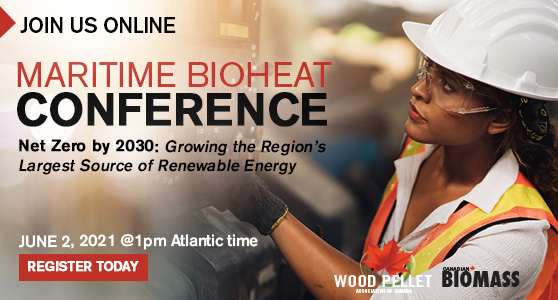|
 |
| |

|
| |
|
Net Zero by 2030: Growing the Region’s Largest Source of Renewable Energy
|
| |
Please join the Wood Pellet Association of Canada for the first-ever Maritime Bioheat Conference, Net Zero by 2030: Growing the Region’s Largest Source of Renewable Energy. Transitioning to biomass heating is a win for the environment and a win for Maritime households and businesses. By using local natural and renewable resources, provinces like Nova Scotia and New Brunswick could reduce CO2 emissions by 3.2 million tonnes per year or about 16% of the Canadian Clean Fuel Standard’s 2030 target for liquid fuels. It could also result in a savings of nearly $1 Billion for household and commercial heating across these two provinces.
Registration is open to everyone and free for this online three-hour conference on June 2, 2021 at 1 p.m. Atlantic. Live conference sessions will be available in both English and French.
TOPICS INCLUDE:
- Getting to Net Zero by 2030: how modern biomass can support provincial and federal targets.
- Sustainable, Renewable Energy Solutions: a look at the intersection of modern biomass and other low carbon technologies in reducing carbon emissions.
- Bioheat systems 101: understanding wood pellets and chips, boilers, stoves, district heating and how they perform.
- Global solutions; Local Benefits: how modern biomass can alleviate energy poverty in Atlantic Canada, revitalize the forest sector and contribute to a healthy climate.
- How Wood Pellets Stack Up: comparing the benefits of wood pellets, heating oil and electricity.
- Global Success Stories: an in-depth look at European case studies and trends.
- Heating Up in the Maritimes: a review of the growing demand for renewable, clean energy in the Maritimes with local success stories.
- Feeling Good About Pellets: Why wood pellets are the responsible choice for renewable heat and energy.
WHO SHOULD ATTEND?
- Commercial and institutional project developers
- Engineers and architects
- Municipal, provincial and federal decision-makers in charge of GHG reduction planning and facility heating
- Sawmill industry, Forest owners and managers
- Suppliers of biomass heating equipment, Biomass fuel suppliers
- Universities, schools, hospitals and other institutions
|
| |
|

|
|
| | |


